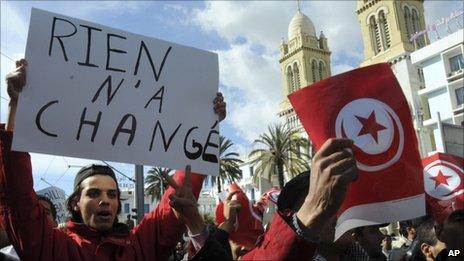Arab revolt: Tunisia's 'stolen revolution'?
- Published

Some Tunisians say nothing has changed since the departure of Mr Ben Ali
Nearly two months after President Zine al-Abidine Ben Ali fled the country he ruled for 23 years, some Tunisians are asking whether the authoritarian system he created is really being dismantled.
Protesters are camping beside the prime minister's office in central Tunis. Hundreds of people from all over the country are now living in the tented city, singing protest songs and asking passers-by to sign petitions.
"Nothing has changed," said a student standing by one of the tents.
A young bearded man standing beside her, his head swathed in a chequered red-and-white scarf, nodded in agreement: "We don't trust the new government."
Last weekend protesters marched through central Tunis to demand more rapid change and fought running battles with the police.
The police fired live rounds into the crowds, killing five people.
Gerontocracy
At a smoke-filled cafe in central Tunis a group of policemen sporting short haircuts and leather jackets gave their version of events.
"Some people - we don't know who - broke into the interior ministry and threatened the people working inside. These people are going to make the country a mess. So I don't mind killing them," said one of the police officers as he flicked ash on the cafe's marble floor and sipped black coffee.
Although the police did manage to suppress the protests, the demonstrators did not go away empty-handed.
Prime Minister Mohamed Gannouchi, who had hung on from the Ben Ali era, announced he was stepping down. He was replaced by former Foreign Minister Beji Caid Sebsi.
Tunisia is now governed by a 78-year-old interim president and an 84-year-old interim prime minister. The youth revolution has spawned a gerontocracy.
"All these young people who went on the streets to force Ben Ali out, they have just handed the revolution to these people on a silver plate," said Raoudha Ben Othman of Tunis University.
There are no national level politicians who speak for the revolutionaries. Instead the government consists of established politicians and a few new faces in the form of technocrats.
Zami Zaoui is one of them. A suave, immaculately dressed business consultant, he became secretary of state for communications and technology in the interim government. But earlier this week he resigned.
He thought he was joining a government of national unity that would enjoy broad support as it managed the transition to elections. But the interim government's work has been more contested than he had anticipated.
"The revolution can not be stolen," he said, adding that "it now needs political stability".
But Mr Zaoui conceded that when it came to communicating a more politically suitable image, the interim government should have had fewer faces from the Ben Ali era.
'Good sign'
Street protests have very rapidly become a regular feature of life in Tunis, and some of the demonstrators gathered outside a sports hall in the capital have been making an unusual demand - they have been chanting slogans in favour of less change.
"We want the economy to start again," said one of the pro-stability protesters outside the sports hall. "We need government and we don't need anarchy. "
Despite the concerns about the fate of the revolution, many Tunisians are enjoying their new freedoms.
"For the first time you can write what you think without censorship: either self-censorship or from your boss," said senior Tunisian newspaper journalist Assia Atrous. "If we don't succeed it means we go back under dictatorship."
There are echoes in Tunisia of the debates that followed the invasion of Iraq - is the region ready for democracy? Can the revolution work?
Raoudha Ben Othman believes that in the country where the revolutionary flame was lit, the democratic gains can be made to stick because people understand they need to be alert if they are to protect the progress they have made.
"The Tunisian people, unlike the Egyptians, they have not celebrated the revolution and that's a good sign," she said.